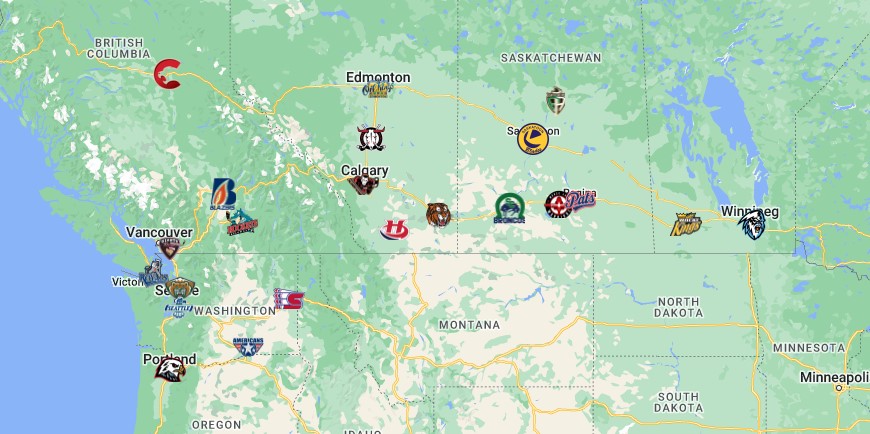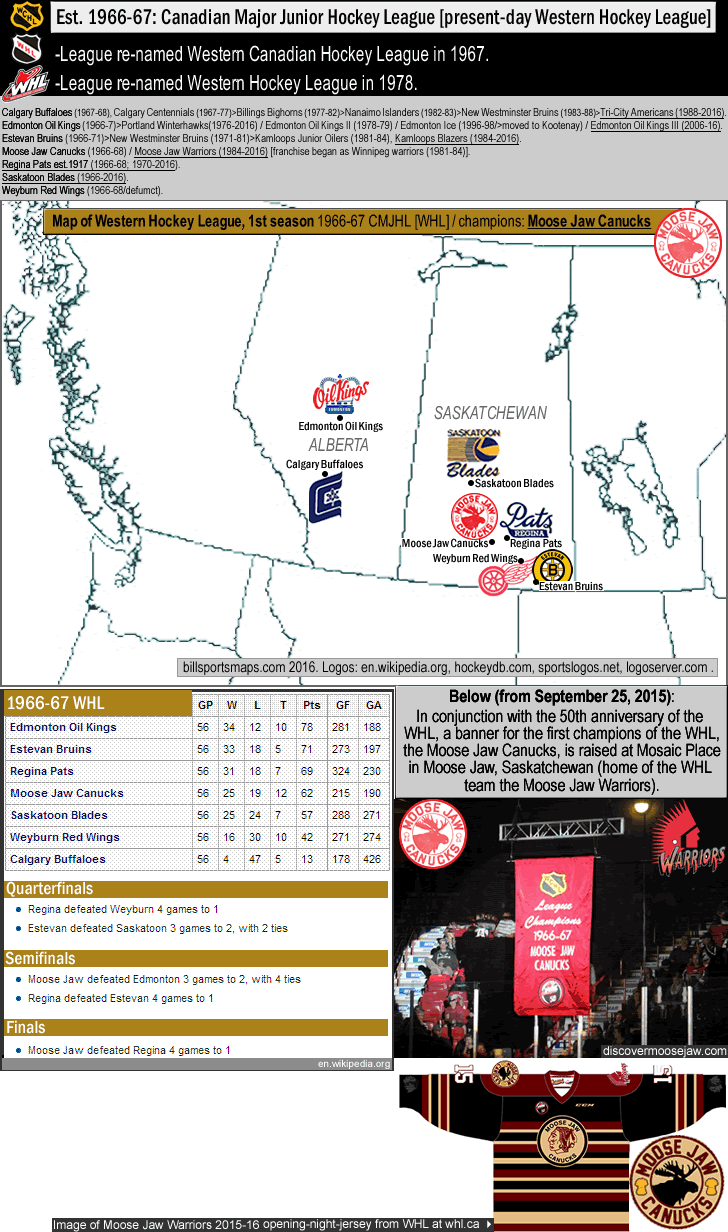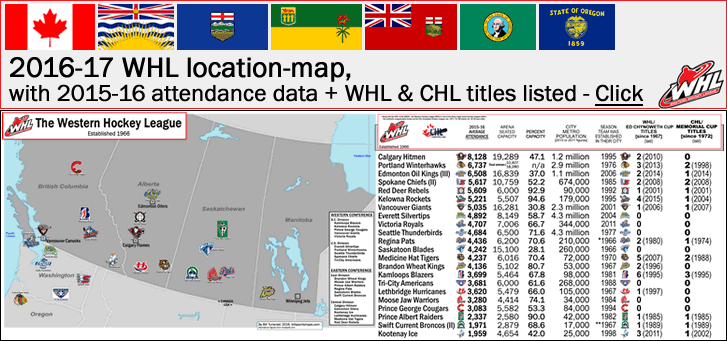Navigating the Western Hockey League: A Comprehensive Guide to the WHL Team Map
Related Articles: Navigating the Western Hockey League: A Comprehensive Guide to the WHL Team Map
Introduction
With great pleasure, we will explore the intriguing topic related to Navigating the Western Hockey League: A Comprehensive Guide to the WHL Team Map. Let’s weave interesting information and offer fresh perspectives to the readers.
Table of Content
Navigating the Western Hockey League: A Comprehensive Guide to the WHL Team Map
The Western Hockey League (WHL) is a prestigious junior ice hockey league in Western Canada and the United States, renowned for its development of future NHL stars. With its vast geographical reach, understanding the team locations and their respective regional identities is crucial for fans, scouts, and anyone interested in the league’s dynamics. This comprehensive guide aims to illuminate the WHL team map, providing a detailed overview of each team’s location, history, and unique characteristics.
A Geographical Overview: The WHL’s Expansive Reach
The WHL’s footprint extends across four Canadian provinces (British Columbia, Alberta, Saskatchewan, and Manitoba) and four US states (Washington, Oregon, Idaho, and Montana). The league’s diverse geography reflects the varied landscapes and cultural identities of its regions, contributing to the unique character of each team.
The Western Division: Where Hockey Roots Run Deep
The Western Division encompasses the heart of the Canadian prairies, boasting a rich history of hockey tradition.
- Calgary Hitmen: Based in Calgary, Alberta, the Hitmen have a long history of success, having won the WHL Championship in 2006 and 2010. Their home arena, the Scotiabank Saddledome, is also home to the NHL’s Calgary Flames, fostering a strong hockey culture in the city.
- Edmonton Oil Kings: Edmonton, Alberta, is synonymous with hockey, and the Oil Kings represent this passion. They have won the WHL Championship twice, in 1984 and 2014, and their home arena, Rogers Place, is also home to the NHL’s Edmonton Oilers.
- Lethbridge Hurricanes: Lethbridge, Alberta, is a city known for its dedication to junior hockey. The Hurricanes have a long history of competitive play, having won the WHL Championship in 1996 and 1997.
- Medicine Hat Tigers: Medicine Hat, Alberta, boasts a strong hockey tradition, with the Tigers having won the WHL Championship in 1987 and 1995. The Tigers’ home arena, Co-op Place, is a vibrant hub for hockey fans in the city.
- Moose Jaw Warriors: Moose Jaw, Saskatchewan, is a city with a passionate hockey fanbase. The Warriors have won the WHL Championship twice, in 1983 and 2000, and their home arena, Mosaic Place, is a key part of the city’s identity.
- Prince Albert Raiders: Prince Albert, Saskatchewan, is a city with a rich hockey history. The Raiders have won the WHL Championship twice, in 1985 and 2019, and their home arena, the Art Hauser Centre, is a popular venue for hockey fans in the region.
- Regina Pats: Regina, Saskatchewan, is a city with a strong hockey legacy. The Pats have won the WHL Championship four times, in 1974, 1980, 1982, and 2018, and their home arena, the Brandt Centre, is a testament to the city’s dedication to the sport.
- Saskatoon Blades: Saskatoon, Saskatchewan, is a city with a vibrant hockey culture. The Blades have won the WHL Championship twice, in 1988 and 2000, and their home arena, SaskTel Centre, is a popular venue for hockey fans in the city.
The Central Division: A Blend of Tradition and Emerging Talent
The Central Division showcases a mix of established franchises and newer additions, reflecting the growth and dynamism of the WHL.
- Brandon Wheat Kings: Brandon, Manitoba, is a city with a long history of hockey excellence. The Wheat Kings have won the WHL Championship five times, in 1979, 1982, 1996, 2016, and 2018, and their home arena, Westoba Place, is a testament to the city’s passion for the sport.
- Kamloops Blazers: Kamloops, British Columbia, is a city with a strong hockey culture. The Blazers have won the WHL Championship twice, in 1992 and 1995, and their home arena, Sandman Centre, is a popular venue for hockey fans in the city.
- Kelowna Rockets: Kelowna, British Columbia, is a city known for its vibrant hockey scene. The Rockets have won the WHL Championship twice, in 2004 and 2005, and their home arena, Prospera Place, is a testament to the city’s dedication to the sport.
- Portland Winterhawks: Portland, Oregon, is a city with a long history of hockey, and the Winterhawks are a key part of the city’s sports landscape. The Winterhawks have won the WHL Championship twice, in 1986 and 1998, and their home arena, Veterans Memorial Coliseum, is a historic venue for hockey fans in the region.
- Seattle Thunderbirds: Seattle, Washington, is a city with a growing hockey fanbase. The Thunderbirds have won the WHL Championship twice, in 1997 and 2017, and their home arena, accesso ShoWare Center, is a testament to the city’s enthusiasm for the sport.
- Spokane Chiefs: Spokane, Washington, is a city with a passionate hockey fanbase. The Chiefs have won the WHL Championship twice, in 1991 and 2008, and their home arena, Spokane Arena, is a popular venue for hockey fans in the region.
- Tri-City Americans: Kennewick, Washington, is a city with a strong hockey tradition. The Americans have won the WHL Championship once, in 2015, and their home arena, Toyota Center, is a key part of the city’s identity.
The East Division: Where Hockey Traditions Meet Modern Innovation
The East Division showcases a blend of historic franchises and emerging teams, highlighting the dynamic evolution of the WHL.
- Everett Silvertips: Everett, Washington, is a city with a growing hockey fanbase. The Silvertips have won the WHL Championship once, in 2017, and their home arena, Angel of the Winds Arena, is a testament to the city’s enthusiasm for the sport.
- Kootenay Ice: Cranbrook, British Columbia, is a city with a passionate hockey fanbase. The Ice have won the WHL Championship once, in 2002, and their home arena, Western Financial Place, is a popular venue for hockey fans in the region.
- Prince George Cougars: Prince George, British Columbia, is a city with a strong hockey tradition. The Cougars have won the WHL Championship once, in 2006, and their home arena, CN Centre, is a testament to the city’s dedication to the sport.
- Red Deer Rebels: Red Deer, Alberta, is a city with a vibrant hockey culture. The Rebels have won the WHL Championship once, in 1986, and their home arena, Peavey Mart Centrium, is a popular venue for hockey fans in the city.
- Swift Current Broncos: Swift Current, Saskatchewan, is a city with a long history of hockey excellence. The Broncos have won the WHL Championship twice, in 1989 and 2018, and their home arena, Innovation Credit Union i-Plex, is a testament to the city’s passion for the sport.
- Vancouver Giants: Vancouver, British Columbia, is a city with a renowned hockey history. The Giants have won the WHL Championship once, in 2006, and their home arena, Langley Events Centre, is a testament to the city’s dedication to the sport.
- Victoria Royals: Victoria, British Columbia, is a city with a strong hockey tradition. The Royals have won the WHL Championship once, in 2019, and their home arena, Save-On-Foods Memorial Centre, is a key part of the city’s identity.
Beyond the Map: Understanding the WHL’s Cultural Impact
The WHL team map is more than just a geographical representation; it signifies a network of communities deeply invested in hockey. Each team’s unique identity is shaped by its local culture, fan base, and history, creating a tapestry of regional pride and passionate support.
Understanding the Dynamics of the WHL Team Map
The geographical layout of the WHL teams influences the league’s competitive landscape. The proximity of certain teams fosters intense rivalries, while the distances between others create unique challenges for travel and scouting. This dynamic interplay of location and competition contributes to the WHL’s captivating character.
FAQs: Addressing Common Inquiries about the WHL Team Map
Q: What is the purpose of the WHL team map?
A: The WHL team map provides a visual representation of the league’s geographical reach, highlighting the locations of each team and their respective regions. It serves as a valuable resource for fans, scouts, and anyone interested in understanding the league’s structure and dynamics.
Q: How does the WHL team map influence the league’s competitive landscape?
A: The geographical distribution of teams influences the intensity of rivalries, the challenges of travel, and the strategies employed by teams in scouting and player development. This interplay of location and competition contributes to the WHL’s unique character.
Q: What are the key factors that shape the identity of each WHL team?
A: Each team’s identity is shaped by its local culture, fan base, and history. The team’s success, its relationship with the community, and its role in the development of future NHL stars all contribute to its unique character.
Tips for Navigating the WHL Team Map
- Research team histories: Explore the rich histories of each team, understanding their achievements, rivalries, and contributions to the league’s legacy.
- Attend games and events: Immerse yourself in the vibrant atmosphere of WHL games, experiencing the passion of the fans and the excitement of the competition.
- Follow teams on social media: Engage with teams on social media, staying updated on news, announcements, and player developments.
- Explore team websites: Visit team websites to access information about rosters, schedules, tickets, and community initiatives.
Conclusion: Embracing the WHL’s Diverse Landscape
The WHL team map serves as a powerful reminder of the league’s expansive reach and its deep connection to the communities it serves. By understanding the geographical distribution of teams, their unique identities, and the dynamics of the competitive landscape, fans, scouts, and anyone interested in the WHL can appreciate the league’s rich tapestry of hockey culture and its enduring legacy. The WHL team map is more than just a visual representation; it is a testament to the power of hockey to unite communities and inspire generations of players and fans.








Closure
Thus, we hope this article has provided valuable insights into Navigating the Western Hockey League: A Comprehensive Guide to the WHL Team Map. We appreciate your attention to our article. See you in our next article!
